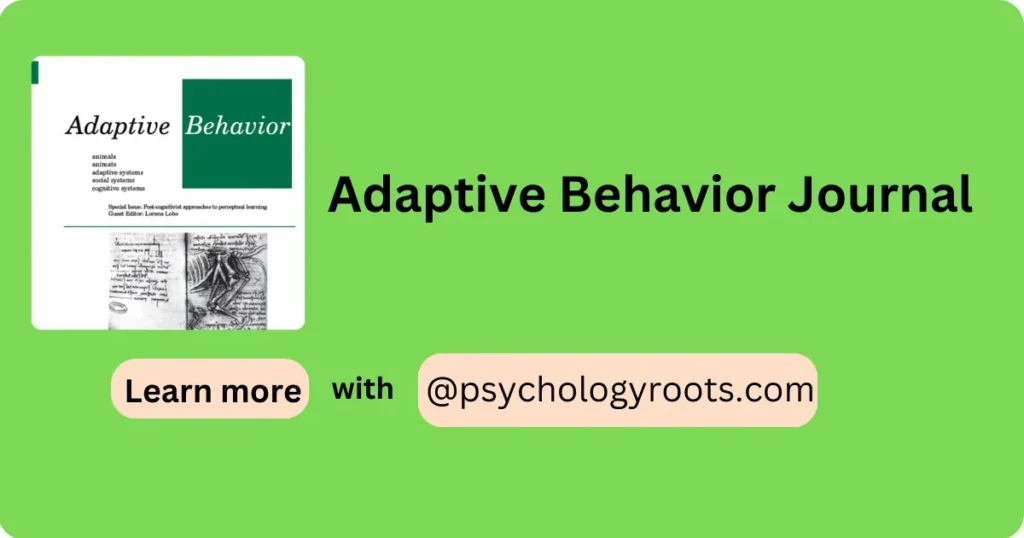Table of Contents
Adaptive Behavior Journal
In this post, we discuss “Adaptive Behavior Journal”. View complete list of journals (Click here to see full list), where you may publish your articles and share your work. This blog will discuss journals’ impact factors, history, and author guidelines to help you publish. You can request any psychology-related article, or Thesis through our Request section, and we will respond quickly. Keep visiting Psychology Roots.
About Adaptive Behavior Journal
Journal Name
Adaptive Behavior Journal
Offical Details
| Subject/Area | Arts and Humanitie Psychology Neuroscience Computer Science |
| Publisher | Sage Publications Ltd |
| Editor in Chief | Tom Froese |
| Impact Factor | 1.6 |
| Frequency | 6 Time in Year (After 2 Month) |
| ISSN | 1741-2633,1059-7123 |
| Webiste | View Here |

Background/Description
The concept of adaptive behavior, though seemingly straightforward, delves into the fascinating realm of how living organisms and even artificial systems navigate their environments. The Adaptive Behavior Journal, established in 1992, serves as a prominent platform for exploring this intricate field, fostering collaboration and knowledge exchange across diverse disciplines.
Published bimonthly by SAGE Publications, the journal boasts a peer-reviewed format, ensuring the quality and rigor of the research it disseminates. Its reach extends beyond the boundaries of a single academic field. Psychologists, neuroscientists, ethologists (those who study animal behavior), computer scientists, and even philosophers find a common ground within the journal’s pages. This unique cross-pollination of ideas allows researchers to not only delve deeper into their specific areas of expertise but also draw valuable insights from seemingly disparate disciplines.
The journal’s core mission centers on fostering a dynamic and innovative environment for exploring adaptive behavior. Original research articles and insightful reviews form the backbone of its content. These delve into the fascinating ways both biological and artificial systems adapt to their surroundings. For instance, a computer scientist might contribute research on how robots learn and adjust their behavior based on encountered stimuli. An ethologist, on the other hand, might present a study on how an animal species modifies its foraging patterns in response to changing environmental resources.
The journal doesn’t shy away from tackling complex adaptive systems – systems with numerous interconnected parts that exhibit emergent properties, meaning the whole becomes more than the sum of its individual components. This focus on complexity allows researchers to explore fascinating phenomena like the collective behavior of social insects or the evolution of artificial intelligence systems that can learn and adapt on their own.
The Adaptive Behavior Journal doesn’t limit itself to purely theoretical explorations. The application of this knowledge to real-world problems is a cornerstone of its mission. Articles might explore how understanding adaptive behavior can inform the development of new technologies like prosthetics that can adapt to a user’s needs. Additionally, research on how humans adapt to different environments could inform strategies for social workers or therapists working with individuals facing challenges.
Important
| Author Guidelines | Read Here |
| Fee | Free |
| HEC Pakistan | X Category (Psychology) Y Category (Neurosecience) |
Important Link
Sample Article:
Frequently Asked Questions
What is the Adaptive Behavior Journal?
A bimonthly, peer-reviewed journal focusing on research in adaptive behavior.
Who publishes it?
SAGE Publications.
What disciplines does it cater to?
Psychology, neuroscience, ethology, computer science, philosophy (and more).
What kind of content does it feature?
Original research articles and review papers on how biological and artificial systems adapt to their environments.
Does it cover complex adaptive systems?
Yes, it explores systems with interconnected parts that exhibit emergent properties.
Disclaimer
Please note that Psychology Roots does not have the right to grant permission for the use of any psychological scales or assessments listed on its website. To use any scale or assessment, you must obtain permission directly from the author or translator of the tool. Psychology Roots provides information about various tools and their administration procedures, but it is your responsibility to obtain proper permissions before using any scale or assessment. If you need further information about an author’s contact details, please submit a query to the Psychology Roots team.
Help Us Improve This Article
Have you discovered an inaccuracy? We put out great effort to give accurate and scientifically trustworthy information to our readers. Please notify us if you discover any typographical or grammatical errors.
Make a comment. We acknowledge and appreciate your efforts.
If you have any scale or any material related to psychology kindly share it with us at psychologyroots@gmail.com. We help others on behalf of you.